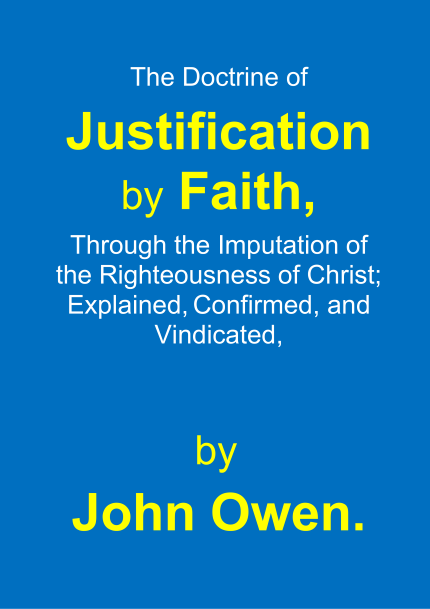By John Owen.

The doctrine of Justification by Faith, through the Imputation of the Righteousness of Christ; explained, confirmed and vindicated.
By dr. John Owen.
Contents:
First, The general nature of justification: –State of the person tobe justified antecedently thereunto, Rom.4:5; 3:19; 1:32;
Gal.3:10; John 3:18,36; Gal.3:22
–The sole inquiry on that state
–Whether it be any thing that is our own inherently, or what is only imputeduntous, that we are to trust unto for our acceptance with God
–The sum of this inquiry
–The properends of teaching and learning the doctrine of justification
— Things to be avoided therein
Secondly, A due consideration of God, the Judge of all, necessary unto the right statingand apprehension of the doctrine of justification, Rom.8:33; Isa.43:25; 45:25;
Ps.143:2; Rom.3:20
–What thoughts will be ingenerated hereby in the minds of men, Isa.33:14;
Micah 6:6,7; Isa.6:5
–The plea of Job against his friends, and before God, not the same, Job40:3-5, 43:406
— Directions for visiting the sick given of old
–Testimonies of Jerome and Ambrose
–Sense of men in their prayers, Dan.9:7,18; Ps.143:2, 130:3,4
–Paraphrase of Austin on that place
–Prayerof Pelagius
–Public liturgies
Thirdly, A due sense of our apostasy from God, the depravation o four nature thereby, with the power and guilt of sin, the holiness of the law, necessary unto aright
understanding of the doctrine of justification
–Method of the apostle to this purpose, Rom.1,2,3
— Grounds of the ancient and present Pelagianism, in the denial of thesethings–Instances thereof –Boasting of perfection from the same ground
–Knowledge of sinand grace mutually promote each other
Fourthly, Opposition between works and grace, as unto justification
–Method of the apostle, in the Epistle to the Romans, to manifest this opposition–A scheme of others contrary thereunto
–Testimonies witnessing this opposition
–Judgment tobe made on them
–Distinctions whereby they are evaded
–The uselessness of them
–Resolution of the case in hand by Bellarmine, Dan.9:18; Luke 17:10
Fifthly, A commutation as unto sin and righteousness, by imputation, between Christ
and believers, represented in the Scripture
–The ordinance of the scapegoat, Lev.16:21,22
–Thenature of expiatory sacrifices, Lev.4:29, etc
–Expiation of an uncertain murder, Deut.21:1-9
–The commutation intendedproved and vindicated, Isa.53:5,6; 2 Cor.5:21;
Rom.8:3,4; Gal.3:13,14; 1 Pet.2:24; Deut.21:23
–Testimonies of Justin Martyr, Gregory Nyseen, Augustine, Chrysostom, Bernard, Taulerus, Pighius, to that purpose
–The proper actings of faith with respect thereunto, Rom.5:11; Matt.11:28;
Ps.38:4; Gen.4:13; Isa.53:11; Gal.3:1; Isa.45:22; John 3:14,15
–A bold calumny answered
Sixthly,
Introduction of grace by Jesus Christ into the whole ofour relation unto God, andits respect unto all the parts of our obedience
–No mystery of grace in the covenant of works
–All religion originally commensurate unto reason
–No notions of natural light concerning the introduction of the mediationof Christ and mystery of grace, into our relation to God, Eph.1:17-19
–Reason, as corrupted, can have no notions ofreligion but what are derivedfromits primitive state
–Hencethe mysteries of the gospel esteemed folly
–Reason, as corrupted, repugnant unto the mystery of grace
–Accommodationof spiritual mysteries unto corrupt reason, wherefore
acceptable unto many
–Reasons of it –Two parts of corrupted nature’s repugnancy unto the mystery of the gospel: –1. That which would reduce it unto the private reason of men–ThencetheTrinitydenied, and the incarnation of the Son of God; without which the doctrineof
justification cannot stand–Rule of the Socinians in the interpretation of theScripture
–2. Want of a due comprehension of the harmony that is between all 4 the parts of the mystery of grace
–This harmony proved
— Compared with the harmony in the works of nature
–To be studied
–But it is learned only of them who are taught of God; and in experience
–Evil effects of the want of a due comprehension hereof–Instances of them–All applied unto thedoctrine of justification
Seventhly, General prejudices against the imputation of the righteousness of Christ: –1. That it is not in terms found in the Scripture, answered
–2. That nothing is said of it in the writings of the evangelists, answered, John20:30,31
–Natureof Christ’s personal ministry
–Revelations by the Holy Spirit immediately from Christ –Design of the writings of the evangelists
–3. Differences among Protestants themselves aboutthis doctrine, answered–Sense of the ancients herein
–What is of real difference among Protestants, considered
Eighthly,
Influence of the doctrine of justification into the first Reformation
–Advantages unto the world by that Reformation
— State of the consciences of men under the Papacy, with respect unto
justification before God
–Alterations made therein by the light of this doctrine, though not received–Alterations in the Pagan unbelieving world by the introduction of Christianity–Design and success of the first reformers herein
–Attempts for reconciliation with the Papists in this doctrine, and their success–Remainders of the ignorance of the truth in the Roman church
–Unavoidable consequences of thecorruption of this doctrine
Looking for a Hardcover or Paperback?
For those who want to have a hardcover or a paperback of this book, I want to suggest you to look here.